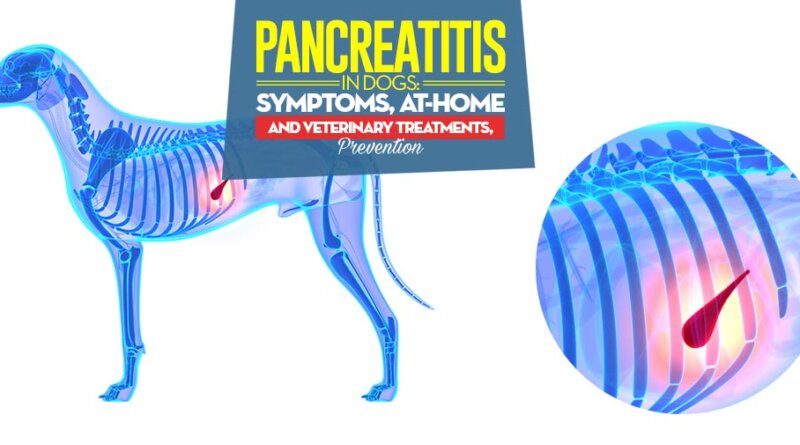Symptoms, Causes, Treatments and Prevention
The pancreas is an organ located in the abdominal cavity responsible for producing digestive enzymes and insulin production.
A well-known condition, pancreatitis, refers to pancreatic inflammation.
When inflamed, the pancreatic enzymes can spill out of the pancreas and onto surrounding organs.
The closest organs to the pancreas are the kidneys and liver, and the release of these pancreatic enzymes causes the dog’s body to start digesting these vital organs.
Studies show that pancreatitis is the most common pancreas disorder (1) in both dogs and cats.
There are two different types: chronic pancreatitis and acute pancreatitis.
Acute pancreatitis can range from the following: mild pancreatitis to, worst case scenario, severe pancreatitis.
Chronic pancreatitis is rare but just as serious.
We’ll talk about the clinical signs and differences between the two later.
Violent symptoms of canine pancreatitis can be traumatic for owners to witness, but it’s important to stay calm and focus on seeking veterinary help.
Be aware of what your dog has eaten, and double-check what anyone else in the family may have fed him.
If your dog is suffering from pancreatitis, he may experience the following symptoms:
- vomiting
- fever
- diarrhea
- difficulty breathing
If you notice any of these symptoms that come on very quickly, head to the veterinary clinic immediately.
While these are clinical signs of many other dog health problems, it’s best to have them checked by a vet.
This is especially important if the symptom comes on suddenly or if you notice a combination of multiple symptoms.
Diagnosing pancreatitis needs to take very little time because it requires swift, aggressive treatment if it turns out to be the culprit.
If left untreated, it may cause permanent pancreatic tissue damage and damage to the surrounding organs.
Once pancreatitis has been diagnosed, initially, the best course of action is to restrict food and limit water for your dog.
The body has a lot of work to do to begin healing the pancreas, and by eating, your dog’s body will try to kick the pancreas back into action.
This will do more damage than good and can trigger pancreatitis all over again.
The good news is that with prompt treatment, the dog’s pancreas will be able to return to full health and function.
If you catch the symptoms early, your dog can make a full recovery and will be back to his old self in just a few days.
Now, let’s get into more detail about pancreatitis in dogs and the treatments that will be available to you.
I’ll also give you a list of certain breeds most prone to developing pancreatitis and discuss what you can do to prevent pancreatitis in your pet.
RELATED: 31 Dog Food and Feeding Myths You Need to Stop Believing Right Now
Pancreatitis in Dogs: Symptoms, At-Home and Veterinary Treatments, Prevention
What is Pancreatitis in Dogs?
Let’s take a brief look at what the pancreas does in the dog’s body.
We’re all aware of the importance of digestive enzymes and insulin to our and our canines’ digestive process.
If not, the pancreas has two different types of glands: endocrine and exocrine.
The exocrine function of the pancreas produces digestive enzymes to help us break down food.
The endocrine function helps regulate blood sugar.
Pancreatitis is a condition that causes inflammation of pancreatic tissue in the, you guessed it, pancreas.
There are several severity stages (2) of this disease, from mild to severe and from acute to chronic.
Usually, it’s the mild cases of pancreatitis that are observed in dogs, but in rare instances of more severe cases of pancreatitis, this condition can be fatal to dogs (the data shows that there’s a 40% chance of death in the case of severe pancreatitis).
Acute pancreatitis in dogs is the least common condition among canines (3).
The proper function of the pancreas is to produce and channel digestive enzymes straight into the gastrointestinal tract.
However, when the pancreas is inflamed, these enzymes are forced out of the pancreas and into the abdomen.
From there, they move on to surrounding organs, causing your dog’s body to start digesting the wrong things entirely.
Due to the proximity of the organ to the kidneys and liver, the inflammation can be most dangerous to these specific organs.
If you are worried that your dog may be suffering from pancreatitis, seek immediate veterinary care and treatment.
SIMILAR: What Is Systematic Lupus Erythematous in Dogs?
Causes of Pancreatitis in Dogs
Studies show that pancreatitis may be caused by a multitude of factors (4, 5) and their correlation to each other.
The complex interplay between these factors usually includes the dog’s age, breed, medical history and drug use, weight, previous traumas, and any other diseases that could be related to dog’s pancreas or the endocrine system.
Can certain food and diet cause pancreatitis in dogs? Maybe.
Food have been often named as the cause of pancreatitis by pet owners and some veterinarians; however, there’s currently no hard evidence on how big of a factor certain dog food diets have on increasing the chance of pancreatitis in dogs.
A study with healthy dogs fed different types of diets have found little to no correlation (6).
High fat diets have been named as potential cause of pancreatitis or dogs, or at the very least adding to the severity or predisposition to this condition.
There’s no research on this with dogs, but studies with rats have shown that there may be some correlation between a high fat diet and even a high protein diet and pancreatitis ( 7, 8, 9).
What about canine diabetes? Can it cause pancreatitis in dogs?
Data shows that there’s certainly a clear relation (8) between pancreatitis and diabetes, and obesity.
However, we currently don’t know whether it’s diabetes that causes pancreatitis or the other way around – pancreatitis causes diabetes.
Nevertheless, an obese or diabetic dog will have a harder time fighting off pancreatitis.
The most likely cause of pancreatitis is an interplay between several factors.
As noted above, causes of pancreatitis are very difficult to determine (9); it is likely your dog’s age, breed predisposition, weight, previous drug use and medical history, genetics and other factors that will determine how likely the dog is to develop pancreatitis.
Neutering and spaying your dog may or may not have an impact on this as well.
There are also other known causes of pancreatitis, including mistimed enzyme attacks.
The way that the pancreas works when it’s healthy is it produces inactive digestive enzymes that travel through your dog’s pancreatic duct before they then activate and get to work digesting food in the small intestine.
On occasion, the inactive digestive enzymes prematurely activate while still within the pancreas.
This is akin to a firework going off inside of a house – it will cause damage to your dog’s health that needs immediate repair.
Breeds Most Likely to Suffer from Pancreatitis
Genetics plays a huge factor.
There are some breeds specifically known to have a greater chance of developing pancreatitis, according to some studies (10).
Breeds most likely predisposed for pancreatitis:
- Miniature Schnauzer
- Dachshunds
- Poodles
- Schnauzer
- Miniature Poodle
- Cocker Spaniel
- German Shepherd
- Fox Terriers
- Alaskan Malamutes
- Laikas
With many breeds that are genetically susceptible to canine pancreatitis condition, it is caused almost always by mistimed enzyme attacks as opposed to diet.
Having said that, as these breeds have a higher predisposition than most dogs and others to developing pancreatitis, it’s vital that they are kept on a healthy diets and regular exercise regimes to avoid obesity and diabetes, which may or may not contribute to development of pancreatitis.
ASK A VET: How to Put an Overweight Dog on a Diet?
Best Diet for Dogs With Pancreatitis
Although there is no scientific proof, there’s some anecdotal evidence floating around that a potential contributing factor to pancreatitis is an overly fatty diet.
Some dog owners feed their dogs raw meat with fat untrimmed or provide too much dietary fat from other sources, such as, fatty table scraps, and human foods that can hide an incredible amount of fat.
With canines and humans requiring entirely different levels of dietary fat in their diet to live a healthy life, this is often where the confusion can happen.
While some human foods are good for dogs and should be fed to improve their overall diet and health, there are plenty of others human foods that you should avoid feeding to your dog.
Owners also need to remember that diseases of the dog’s endocrine system, including hypothyroidism and diabetes, make any dog – immaterial of breed, weight, and diet – more prone to this disease.
If your pet has been diagnosed with a disease of the endocrine system, it’s vital that you give special consideration to the diet you feed him.
In this case, it’s best to work with a canine nutritionist.
They will help guide you in choosing a diet that will meet your dog’s nutritional needs, cater his current health condition and hopefully prevent future conditions from developing.
Here are some low-fat and low-protein dog food formulas and diets:
Common Symptoms of Chronic and Acute Pancreatitis in Dogs
A disturbing sight for any owner to witness, the symptoms of pancreatitis can seem rather extreme.
Physical symptoms of ACUTE pancreatitis may include:
- vomiting
- fever
- diarrhea
- irregular heartbeat
- difficulty breathing
- extreme lethargy
- sensitivity on and around the belly
- dehydration
I must reiterate how important it is to seek immediate medical attention as soon as you suspect that your dog may be suffering from this sickness.
If left untreated, your dog will suffer permanent damage to his health.
Acute pancreatitis could even be life-threatening if not treated appropriately and in a timely manner.
RECOMMENDED: 15 Cheap Ways to Prevent Most Common Health Issues in Dogs
Chronic pancreatitis is a little different and the symptoms are not as easy to spot out.
Diagnosing chronic pancreatitis is just as serious because it means that things can change fast.
Your dog can go from having mild pancreatitis symptoms to severe acute symptoms.
Here are the symptoms of chronic pancreatitis:
- Lack of a desire to eat
- Your dog has abdominal pain coupled with vomiting
- Noticeably lethargic
Common Misdiagnosis of Pancreatitis in Dogs
There has been much talk on the subject of the misdiagnosis of other ailments similar to canine pancreatitis as well as assessing its severity (11).
But if your dog is suffering from pancreatitis, it’s highly uncommon for this to work the other way around.
Testing advancements, including the canine pancreatic specific lipase test that tests for the specific pancreatic enzyme, have made it far easier for veterinarians to make a correct diagnosis.
Addison’s disease is possibly the most common misdiagnosis of Pancreatitis in dogs.
In fact, Addison’s is known throughout the veterinary circle as the great imitator.
Its nickname comes from the fact that it can echo the symptoms of many other diseases, including Pancreatitis. With vets coming across far more cases of the latter, it’s easy to see why this misdiagnosis can happen.
Addison’s is a condition that affects the adrenal function of the body. Most notably, this disease affects the generation of cortisol.
Cortisol is an important steroid hormone that regulates the production of glucose, metabolism, and influences the breakdown of fats and proteins in the canine body.
One Case of Pancreatitis in a Dog
If you were to hear the tale of a dog suffering from a bout of pancreatitis due to eating a high-fat meal, I’d forgive you for assuming that the owner was at fault. But, what happens when the owner is not to blame and the dog has brought this upon himself?
That was what happened to Jody, a responsible and caring owner to Duffy the greyhound. Duffy, on the other hand, was not so responsible.
Late one fateful evening, Jody and her husband were in the throes of moving to a new home.
With the distraction of many boxes to move, they unwittingly left their greyhounds unsupervised in the kitchen.
That was when disaster struck.
Duffy managed to find a container of lard and downed the entire thing. We’re not talking a measly amount, but a huge 2-pound tub of cooking fat.
Upon returning to the scene of the crime, Jody was, of course, concerned for the self-lubricated Duffy. However, he was bright eyed and bushy tailed, so they decided to keep an eye on him and not head to the vets.
Suffice it to say, Duffy soon started exhibiting all of the common symptoms of pancreatitis.
Jody loaded him up and headed to the veterinarian. It was touch-and-go for several days.
The veterinary nurses weren’t hopeful. Duffy was very ill and at nine-years-old, he was no spring chicken.
Whether it was luck or Duffy’s sheer tenacity, he somehow pulled through. Now, he sticks to a low-fat diet!
RELATED: Cushing’s Disease in Dogs – Symptoms, Diagnosis and Treatments
How to Prevent Pancreatitis
If you’ve ever had the misfortune of owning or witnessing a dog suffering from pancreatitis, you’ll likely never want to experience or have your pet experience that kind of pain and discomfort ever again.
As I mentioned, providing the proper diet is the best way to prevent this.
Low-fat diet
The best way to avoid pancreas problems is to feed a natural, low-fat diet. Many owners are guilty of throwing their four-legged friends scraps on a frequent basis.
Dogs certainly have a knack for giving the puppy dog eyes whenever food is around, but this is one of those cases where you have to be cruel to be kind.
Do not feed your dog human food that is high in fat.
The recommended daily allowance of fat in a dog’s diet is only 13.8 grams.
That means that by feeding your dog just two slices of cheese, you’re putting him at risk. You don’t want your dog to suffer severe consequences because you like to feed them food they shouldn’t eat.
This should be obvious but avoid high-fat table scraps.
Also, avoid giving your dog a high fatty meal.
These only exacerbate the problem.
READ THIS: 6 Must-Know Tips for Making Your Own Homemade Dog Food
Anti-seizure diet
There are also certain medications and anti-seizure medications known to affect the adrenal function and increase instances of pancreatitis in dogs.
Of course, if your dog requires anti-seizure medication, then the best course of action is to discuss diet and medication options with a veterinarian familiar with your Fido’s medical history.
Optimum Enzymes
Some evidence suggests that dogs and cats cannot produce enough enzymes to digest their food adequately.
Experts theorize that this may be due to our pets previous diet, which consisted of freshly caught meat and all of the innards that went along with this. Therefore, much of the enzymes to digest their food came from the food itself.
Nowadays, if you’re opposed to feeding entrails, supplements exist to give your pup a digestive boost.
Before adding any supplementation to your dog’s diet, you need to discuss the change with your veterinarian.
At-home Treatment of Pancreatitis
Treatment can’t safely take place at home, instead – phone your vet immediately.
However, upon discharge from the pet hospital – there are certain things that you can do to aid in your pooches recovery.
Hydration
In the first 24 to 48 hours, your vet may call for restricted access to food and water.
However, after your dog has received the all clear, hydration is essential. It will help your pup to return to full health much sooner.
Digestive Enzyme Supplement
An easy addition to a natural and balanced diet, there are several digestive enzyme supplements available on the market. These supplements can be ideal for those who have gone through a severe case of pancreatitis to minimize the risk of a relapse.
They are also beneficial for breeds more prone to the condition as a preventative measure.
Low-fat diet
This advice should go without saying, but it’s so incredibly important that I’m going to say it anyway.
All dogs should live on a low-fat diet, especially those who have previously experienced pancreatitis.
A strict diet with no scraps and low-fat treats fed very sparingly is the best way to keep your pet healthy.
Veterinary treatment for Pancreatitis in dogs
This is an unfortunately common affliction. Treatments include:
- IV fluids
- Electrolyte supplements
- Potassium supplements
- Antiemetic medication to control vomiting
- Withholding food and water
In summary
The best way to decrease instances of pancreatitis is through knowledge.
Many owners are unaware of the risks associated with high-fat diets, often not knowing that the daily allowance of fat for dogs is as little as it is.
There have also been many cases of dogs having long-term damage, or additional risk of relapse due to owners being slow in seeking medical attention.
Pancreatitis in dogs is not a deadly condition in most cases when spotted quickly and treated.
Do your doggy friends and tell them about the risks and symptoms of this dangerous yet entirely treatable disease.
READ NEXT: 18 Tips On How To Save Money on Dog Care, Health, Vet Bills and Meds
References











